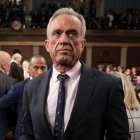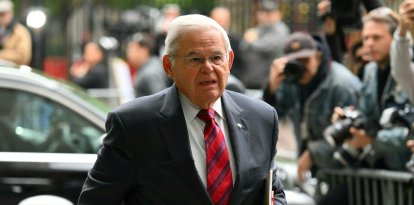The Kennedy Revolution: from the end of trans treatments for minors to the 'freedom' of vaccination
Reducing food prices, leaving the WHO... Robert F. Kennedy Jr. has put his personal stamp on the Department of Health. These are his main measures.

Robert F. Kennedy Jr. at a cabinet meeting.
Following his unsuccessful presidential campaign, Robert F. Kennedy Jr. stepped into leadership at the Department of Health and Human Services (HHS) with a bold mandate: Make America Healthy Again (MAHA). From overhauling the immunization schedule to launching an aggressive campaign against ultra-processed foods, his first four months have been nothing short of frenetic.
Frantic and (relatively) popular: Kennedy Jr. remains the most well-regarded member of the administration, with a 46% favorable rating, according to Harvard/Harris. His unfavorable rating is comparatively low at 37%. A late-May Economist/YouGov poll shows a split opinion on his performance, with 40% approving and 40% disapproving—both figures representing a roughly 3% improvement from the previous month.
Her most popular stance is the crackdown on ultra-processed foods, which enjoys strong backing—73% support, according to an Economist/YouGov poll. Other positions, such as the claim that fluoride in water lowers children's IQ, garner far less approval, even among Republicans: only 33% support the view, while 36% oppose it.
In addition to the internal restructurings, undertaken by all the secretaries and departments of the administration, Kennedy's HHS has undertaken a bulging series of measures with his personal stamp. Some, even, promises he made during his run for the White House.
These are the key measures driving the Kennedy revolution:
Trans treatments
In a recent letter, Kennedy Jr. urged health care providers and medical boards to review their transgender protocols for minors in order "to protect them from (..) harmful interventions."
The secretary wrote that the new compass should be a report released earlier this month, which warned that transgender treatments—both hormonal and surgical—carry a "risk of significant harms." Among them:
"Infertility/sterility, sexual dysfunction, impaired bone density accrual, adverse cognitive impacts, cardiovascular disease and metabolic disorders, psychiatric disorders, surgical complications, and regret."
In his missive, Kennedy draws from the report to argue that while evidence of harm from these treatments is substantial, evidence of their benefits remains limited. "The Hippocratic Oath lays down the foundational commitment for the medical profession: ‘First, do no harm.'"
In April, HHS launched a website to report cases of "chemical and surgical mutilation of children or whistleblower retaliation." The initiative, accompanied by a guidance document for potential whistleblowers, marks a shift long demanded by the conservative camp, which had accused the Biden administration of targeting those who came forward.
In addition, the Centers for Medicare and Medicaid Services (CMS), a branch of HHS, announced investigations into hospitals performing these treatments. "These are irreversible, high-risk procedures being conducted on vulnerable children, often at taxpayer expense," said its administrator, Dr. Mehmet Oz, at the time.
The "poison" of ultra-processed foods
In April, Kennedy Jr. visited Ferdinand T. Day Elementary School in Alexandria, Virginia, to promote healthy snacking. After touring the school and speaking with teachers, the secretary launched his campaign to improve eating habits—one of his signature initiatives.
A month later, Nebraska became the first state to ban the purchase of junk food with food stamps (SNAP). Officials at the Department of Health and Human Services say that more than a dozen states are expected to follow suit.

Politics
A dozen states will join Nebraska in banning the purchase of junk food with food stamps
Emmanuel Alejandro Rondón
According to YouGov, over 70% of Americans agree with Kennedy that "ultra-processed food is driving the obesity epidemic." However, his campaign against processed foods has faced its share of critics.
A common criticism from his detractors is that the campaign will disproportionately affect poorer families, as ultra-processed foods are often more affordable. “It’s an illusion to think that processed food is cheap, because you end up paying for it with diabetes, with autoimmune dysregulation, with mitochondrial dysfunction,” the secretary responded in a recent interview.
"Processed foods are poison."
The questions stemmed from the so-called MAHA report, produced by a commission led by Kennedy Jr. to investigate the "childhood chronic disease crisis." The report highlights several factors contributing to the declining health of U.S. children, ranging from ultra-processed foods to the over-prescription of medications:
Facing accusations of citation and content errors, the White House acknowledged "some formatting issues" and promised to amend the document. "But it does not negate the substance of the report," it assured.
Among other initiatives, HHS criticized fluoride and petroleum-based artificial colorants:

Health
These are the most popular products that use the synthetic dyes identified by the FDA
Diane Hernández
One of the most significant upcoming changes is the revision of the Food Guide for Americans—an official directive that guides federal nutrition programs and school lunches and serves as a reference for professionals.
Kennedy Jr. promised to expedite its publication, which is updated annually, to replace Joe Biden’s version without delay. He said it will be only four pages long, compared to the current 160-page guide, and will essentially advise: "eat whole food, eat the food that’s good for you."
What are "ultra-processed" foods?
The term "ultra-processed" refers to foods at one end of a spectrum, which ranks foods from least to most processed, or from most natural to most industrial.
At the minimally processed end are items like fruits, vegetables, milk, fish, and eggs. On the opposite end, ultra-processed foods often contain additives and ingredients rarely found in home cooking, such as sweeteners, artificial flavorings, and colorings.
Academic research has linked these ultra-processed foods—some even question whether they truly qualify as ‘food’—to a range of health risks, including obesity, diabetes, depression, anxiety, addiction, and sleep problems, among others.

Society
Threats, spying, censorship: researchers denounce pressure from the ultra-processed food industry
Santiago Ospital
Vaccines, a "personal decision"
The media has claimed that I'm either anti-vaccine or anti-industry. Well, I'm neither; I'm pro-safety," Kennedy Jr. assured during his confirmation hearing. "I believe vaccines have a critical role in health care. All of my kids are vaccinated."
During the measles outbreak in Texas in early March, the secretary urged people to get the MMR vaccine. While emphasizing that "the decision to vaccinate is a personal one," he also highlighted its benefits:
"Vaccines not only protect individual children from measles, but also contribute to community immunity, protecting those who are unable to be vaccinated due to medical reasons."
Last month, he announced that COVID-19 vaccines had been removed from the recommended schedule for healthy children and pregnant women. “There’s no evidence healthy kids need it today, and most countries have stopped recommending it for children,” said Dr. Makary, FDA commissioner, during the announcement alongside Kennedy.

Politics
US stops recommending COVID-19 vaccines for healthy children and pregnant women
Agustina Blanco
Goodbye, WHO
The sharp criticism of the World Health Organization (WHO) was the MAHA initiative that generated the most global attention. With the departure of its largest contributor, the organization was forced to cut its departments and management team by half.
Although the administration did not rule out a future return, it demanded certain concessions:
After the departure, Kennedy Jr. called on other countries to follow suit. Argentina responded in kind, and together they urged "all nations" to join them in "shaping a new era of global health cooperation—one focused on results, sovereignty, and a safer future for all."
Price reductions and an end to animal testing
"Our country represents 75 percent of the revenues for pharmaceutical companies," said the secretary, standing alongside Trump as he signed an order to reduce drug prices.
Other key initiatives from his administration include efforts to end drug experiments on animals—such as the controversial "$8 million for making mice transgender," and his commitment to investigating the causes of autism: "We’re pulling back the curtain—with full transparency and accountability—to deliver the honest answers families have waited far too long to hear."






























